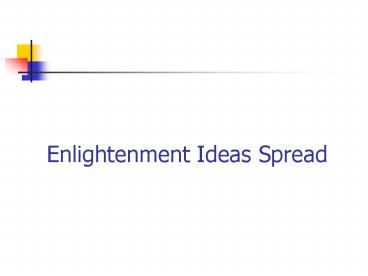Enlightenment Ideas Spread - PowerPoint PPT Presentation
1 / 38
Title:
Enlightenment Ideas Spread
Description:
Enlightenment Ideas Spread Joseph II Son of Maria Theresa Austrian monarch who supported religion freedom Eager student of Enlightenment Traveled throughout the ... – PowerPoint PPT presentation
Number of Views:210
Avg rating:3.0/5.0
Title: Enlightenment Ideas Spread
1
Enlightenment Ideas Spread
2
Map of Enlightenment
3
Paris
Paris, France, was the heart of the Enlightenment
movement in Europe. Many philosophers flocked to
Paris to exchange ideas about society, economics,
politics. They challenged traditional, outdated,
stale beliefs. Philosophers wanted to change the
established way of doing things.
4
Philosphers
Philosophers deemed ideas in the Age of Reason to
be outdated, unscientific, and irrational. A
just society should teach social justice and
happiness for all instead of continuing illogical
traditions.
5
Censorship
- Governments and church disapproved of philosophe
writings because they contradicted traditional
teachings and way of life. - Church and government censored (restricted) new
ideas - Church and government banned and burned books
that contained new ideas about society - Writers were imprisoned
- Many writers disguised their ideas in fictional
novels, a literary form during the Enlightenment - Educated readers realized they were really
reading about the philosophes ideas
6
Salons
- Informal social gathering spots
- Ideas exchanged among writers, artists,
philosophes, etc. - Salons developed in Paris
- Noblewomen invited friends to homes for poetry
readings - Philosophes held intellectual discussions on
numerous topics society, economics, politics
7
Art and Literature Reflected New Ideas About
European Society
8
Baroque Art
- Huge, colorful paintings, full of excitement
- Glorified historical battles or lives of saints
- Age of Louis XIV (French king)
9
CaravaggioSupper at Emmaus
10
CaravaggioThe Decapitation of St. John the
Baptist
11
CaravaggioThe Sacrifice of Isaac
12
Peter Paul RubensDaniel in the Lions Den
13
Peter Paul RubenThe Descent From the Cross
14
Peter Paul RubenThe Garden of Love
15
Rococo
- Less religious themes
- Lighter, splendid, and charming
- Associated with reign of Louis XV-popular in
France - Encouraged imagination
- Painters showed subjects in rural settings
surrounded by happy servants and pets - Too superficial for the philosophes but well
liked by upper and middle classes
16
Francois BoucherAllegory of Painting
17
Francois BoucherPastoral Setting
18
Francois BoucherShepherd Boy Playing Bagpipes
19
Jean-Honoré FragonardThe Swing
20
Antoine WatteauEmbarkation for Cythera
21
Summary of Baroque vs. Rococo
- Baroque is grand and complex
- Rococo is light and charming
22
Music
- Classical music developed
- Ballets and operas
- Music became more affordable for middle classes
23
Johann Sebastian Bach
- Master composer
- Religious compositions for organ and choirs
- Wrote pieces for sonatas and harpsichord
- Click on the following link and listen to some
samples of Bachs musical compositions - http//www.youtube.com/watch?vXIH_4TLHAA4
24
George Friedrich Handel
- Composed Water Music
- Messiah often performed during Christmas and
Easter
25
George Friedrich Handel
26
Franz Joseph Haydn
- Important figure in development of classical
music - Developed music for symphony and string quartet
27
Franz Joseph Haydn(1732-1809)
28
Wolfgang Amadeus Mozart
- Performed operas, symphonies, and emotional
religious music - Died at 35
- Produced enormous amount of music during his
short lifetime
29
W.A. Mozart(1756-1791)
30
Enlightened Despots
- Philosophes tried to convince ruling monarchs to
accept their reformist ideas - Some rulers rejected ideas of philosophes
- Rulers who did accept the ideas were called
enlightened despots - Enlightened despots were absolute rulers who used
their power to make political and social change - They still kept absolute power for themselves
31
Frederick IIaka Frederick the Great
- Absolute ruler of Prussia who accepted
Enlightenment ideas - Reduced torture and allowed free press
- Desired to make Prussia more efficient
- Reorganized governments civil service and laws
- Tolerated religious differences welcomed victims
of religious persecution
32
Catherine the Great
- Empress of Russia
- Believed in Enlightenment ideas of equality and
liberty - Made limited reforms
- Abolished torture
- Established religious tolerance
- Gave nobles a charter of rights
- Criticized serfdom
33
Maria Theresa
- Empress of Habsburg Empire (Austria)
- Worked to improve peasants way of life
- Considered to be an enlightened despot
34
Joseph II
- Son of Maria Theresa
- Austrian monarch who supported religion freedom
- Eager student of Enlightenment
- Traveled throughout the countryside in disguise
to learn problems of his people - Supported religious equality for Protestants and
Jews in his Catholic empire
35
Joseph II
- He ended censorship allowed free press
- Tried to bring Catholic Church under royal
control - Sold property of monasteries to care for the sick
- Abolished serfdom (a servant or laborer of olden
times who was treated as part of the land worked
on and went along with the land if it was sold)
36
Homework Assignment
- Review the following questions on the next slide.
- Write your answers on a sheet of paper.
- We will grade your responses in red pen tomorrow
in class.
37
Powerpoint Questions (12 points)
- 1. What is censorship? What were censored?
- 2. Where did philosophes discuss issues?
- 3. What city was the heart of the Enlightenment?
- 4. Who was an enlightened despot?
- 5. What did Catherine the Great 1) abolish and 2)
establish in Russia? - 6. What reforms did Joseph II make to his
kingdom? (6 points)
38
The End































